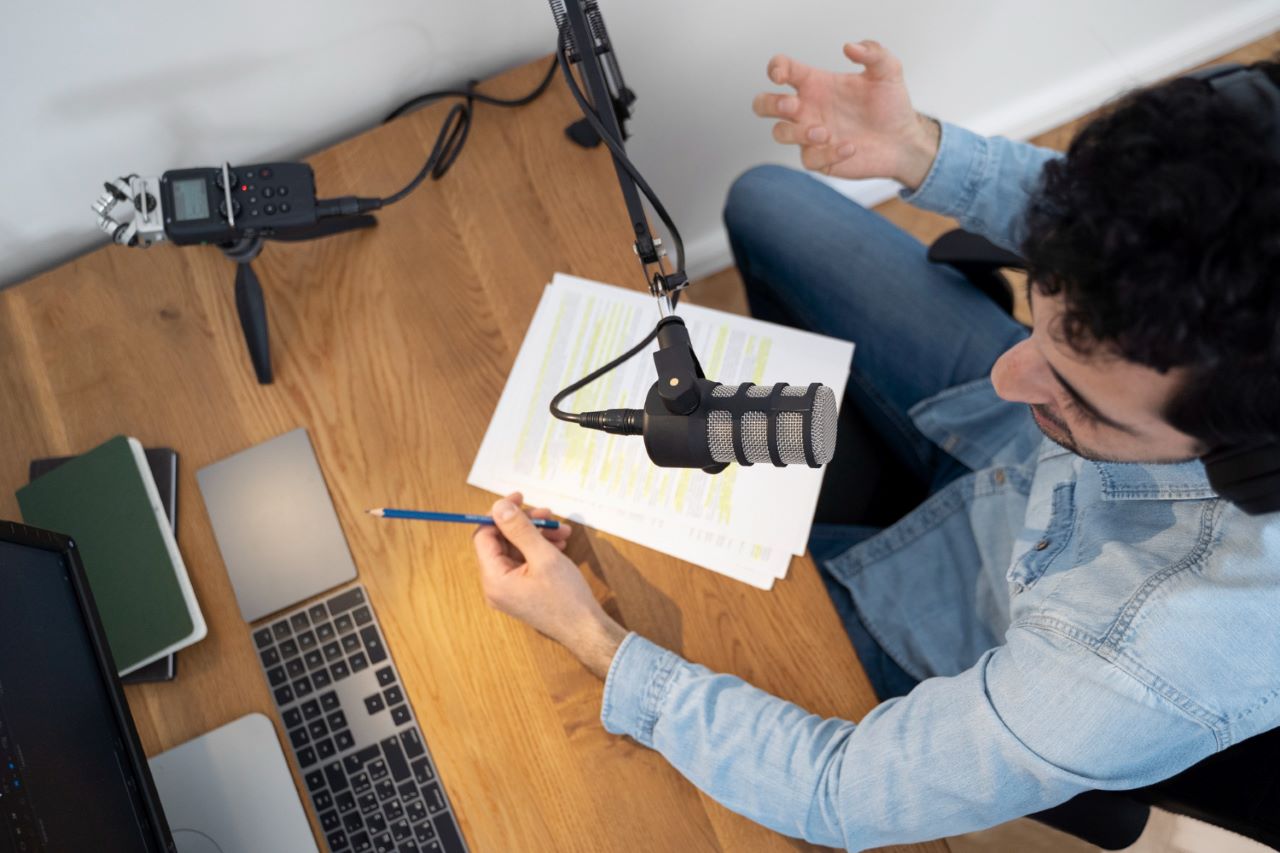Podcasting is an art form that blends creativity with conversation, but it’s not without its guardrails. As a podcaster, you’re a storyteller, an influencer, and sometimes, a provocateur. But where do you draw the line? In this digital era, where words can travel faster than thought, understanding what not to say on a podcast is as crucial as knowing what to say.
This article isn’t just a guide; it’s your roadmap through the maze of legal and ethical boundaries in podcasting. It’s about striking the right balance between bold expression and responsible broadcasting.
Related: Start a Podcast People Will Listen To
What Can You Not Say on a Podcast?
Legal Boundaries In Podcasting
When you’re behind the mic, the world is your audience, but it’s also a world where laws exist. As a podcaster, you’re not just sharing stories or opinions; you’re also subject to legal standards that govern media and communication. From avoiding swear words to respecting copyright, the legal landscape for many podcasters is a terrain that requires careful navigation.
Defamation, Libel, And Slander
Words have power, and in podcasting, your words reach ears far and wide. But what happens when those words harm someone’s reputation? That’s where defamation, libel, and slander come into play. Defamation is a broad term that covers any statement that hurts someone’s reputation. It splits into two categories: libel, which refers to written defamation, and slander, for the spoken kind.
As a podcaster, it’s crucial to understand the weight of your words. A casual remark or an unsubstantiated claim can land you in legal trouble if it’s deemed defamatory. It’s not just about what you say but how you say it. Fact-checking, avoiding assumptions, and steering clear of personal attacks are key practices to keep your podcast out of the defamation danger zone.
Not all negative statements are defamatory. Opinions, for instance, are generally protected. However, the line between a legally permissible opinion and a defamatory statement can be blurry. It’s about context, the way statements are presented, and the difference between an opinion and an assertion of fact. Knowing this distinction is crucial for every podcaster so it’s better to make show notes before going on air.
Copyright And Intellectual Property Laws

Image by Freepik
In the realm of podcasting, creativity meets content, but sometimes, that content belongs to someone else. Copyright laws protect creators from unauthorized use of their work. Whether it’s music, excerpts from books, or even another podcast’s content, using it without permission can lead to legal issues.
You might think quoting a small part of a song or a book falls under ‘fair use,’ but it’s a complex area. Fair use depends on factors like the purpose of use, the nature of the copyrighted work, and the effect on the work’s value. Navigating this path requires a keen understanding of what’s fair and what’s infringement.
As a podcaster, respecting intellectual property isn’t just legal compliance; it’s also about valuing creativity. Always seek permission when using someone else’s work. If in doubt, consult with a legal expert or stick to royalty-free or licensed content. This approach not only keeps you legally safe but also fosters a culture of respect among creators.
Privacy Laws And Confidentiality
In podcasting, you often delve into personal stories and sensitive topics. While this can be compelling, it also brushes up against privacy laws. These laws protect individuals from unauthorized sharing of their personal information. As a podcaster, it’s essential to know when you’re crossing the line from public interest into private lives.
One key rule is consent. Whether it’s an interview or a story involving real people, getting explicit consent to share their information is not just respectful; it’s legally sound. This is especially crucial when dealing with sensitive information or potentially embarrassing facts.
Sometimes, you might be privy to confidential information. This could come from a source, an interviewee, or even a co-host. Respecting confidentiality agreements and understanding the legal implications of breaking them is paramount. It’s not just about legal consequences; it’s about building trust with your audience and your guests.
Striking the right balance between engaging content and respecting privacy is a skill. Always err on the side of caution. If you’re unsure about the legalities, seek legal advice. Remember, a moment of sensationalism isn’t worth a lifetime of legal troubles.
Related: Podcast Agreement with Guests
Ethical Considerations In Podcast Content
Podcasting isn’t just about staying within the legal lines; it’s also about treading the path of ethics. Every word you broadcast carries a responsibility. In this digital age, where your voice can echo across continents, understanding the ethical implications of your content is key. From steering clear of hate speech to ensuring factual accuracy, ethical podcasting is about creating content that respects, informs, and uplifts. It’s where your moral compass meets your microphone.
Hate Speech And Offensive Language

Image by Freepik
In the world of podcasting, your words are your currency. But what happens when those words harm or offend? Hate speech and offensive language are not just ethical landmines; they can alienate and harm segments of your audience. Understanding and avoiding hate speech–language that attacks or discriminates against people based on race, religion, gender, or other identities – is crucial.
It’s not always clear-cut. Sometimes, what’s humorous or edgy to some can be deeply offensive to others. The key is to know your audience and understand the broader social context. It’s about being aware, sensitive, and open to feedback. Always ask yourself: Is this necessary? Is it respectful? Is it inclusive?
Focusing on positive, inclusive language isn’t about censoring creativity; it’s about enhancing it. By choosing words that unite rather than divide, you can create a podcast that resonates with a wider audience. It’s about using your platform to promote understanding and respect, not perpetuating stereotypes or hostility.
Misinformation And Fact-Checking
In an era where fake news can spread like wildfire, podcasters have a role in ensuring the accuracy of their content. Misinformation – spreading false or inaccurate information, whether intentionally or not – can have serious consequences. It can mislead, harm, and even incite. As a content creator, you have the power to influence opinions and beliefs; wield this power responsibly.
Fact-checking isn’t just a buzzword; it’s an essential practice. It involves verifying the accuracy of statements, quotes, and data before broadcasting them. This practice not only safeguards you against spreading falsehoods but also builds your credibility as a trusted voice in the podcasting community.
Leverage the wealth of resources available for fact-checking. Use credible sources for your information, double-check facts with multiple sources, and don’t hesitate to correct yourself on air if you’ve made an error. Being transparent about your fact-checking process can also enhance your loyal listeners’ trust.
By committing to factual accuracy, you’re not just avoiding misinformation; you’re contributing to a more informed and discerning public. In the long run, this commitment enhances the overall quality of discourse and reinforces the positive impact of podcasting as a medium.
Platform-Specific Guidelines And Censorship
In the diverse world of podcast platforms, each comes with its own set of rules. Navigating these guidelines is akin to playing by different sets of rules on different playing fields. From Apple Podcasts to Spotify, each platform has unique policies regarding content. Moreover, understanding censorship and content moderation is vital.
It’s not just about adhering to rules; it’s about understanding the landscape of digital content and how it’s governed. This section will guide you through these varied guidelines and help you make sense of the complex world of content moderation.
Understanding Different Platform Policies

Image by DCStudio on Freepik
Each podcast platform, from Apple Podcasts to Spotify to smaller niche sites, has its own set of guidelines. These policies can vary widely, covering aspects from the type of content allowed to the technical specifications of your audio files. As a podcaster, it’s essential to familiarize yourself with these guidelines to ensure your content is compliant and accessible to your desired audience.
Understanding these policies goes beyond mere compliance. It’s about strategically tailoring your content to maximize its reach and impact. Some platforms may have stricter rules on explicit words, while others might prioritize certain content types. Aligning your content strategy with these policies can enhance your podcast’s visibility and engagement.
Platform policies aren’t set in stone; they evolve. Regularly updating yourself with the latest guidelines is crucial. This proactive approach ensures that your content remains compliant and relevant, and it helps you avoid any unexpected surprises that could disrupt your podcast’s distribution.
Navigating Censorship And Content Moderation
In podcasting, censorship and content moderation can feel like a tightrope walk. On one hand, there’s the freedom of expression, and on the other, there’s the responsibility to adhere to platform-specific content guidelines. Understanding where your content falls within these boundaries is key to maintaining a healthy relationship with both your old/new listeners and the platforms.
Censorship isn’t always about silencing voices; often, it’s about maintaining a safe and respectful environment for all listeners. It’s crucial to find your voice within these boundaries. This means expressing your ideas powerfully yet responsibly, ensuring your content doesn’t inadvertently violate platform policies or alienate your audience.
View content moderation not as a hurdle but as a guiding tool. It helps in creating a podcast that’s not only compelling but also respectful and inclusive. Being mindful of language, themes, and the potential impact of your content can help you steer clear of moderation issues while still delivering powerful messages.
Balancing Creativity With Platform Algorithms
In the world of podcasting, algorithms are the unseen gatekeepers. They can boost your visibility or bury your content in obscurity. Understanding these algorithms is vital. They often prioritize content based on factors like listener engagement, episode consistency, and keyword relevance. But here’s the trick: don’t let algorithms dictate your creative spirit. Instead, use them as a guide to shape your content strategy.
Creating content that resonates with algorithms doesn’t mean sacrificing your creative integrity. It’s about smartly integrating relevant keywords, optimizing your podcast title, and understanding what drives potential listeners’ engagement on each platform. Remember, a healthy balance between creativity and algorithm awareness can elevate your podcast listening reach without compromising on its core essence.
Leveraging Analytics For Compliant Content

Image by DCStudio on Freepik
Analytics are your roadmap in the world of podcasting. They provide insights into what works and what doesn’t, guiding you to create content that not only resonates with your audience but also stays within the boundaries of platform policies.
By examining metrics like listener demographics, podcast episodes drop-off points, and engagement patterns, you gain a deeper understanding of how to tailor your content for compliance and appeal.
Use analytics as a tool to inform your content decisions. For instance, if certain topics or styles lead to higher engagement, explore them further within the confines of platform guidelines. Conversely, if specific content tends to generate flags or lower engagement, it’s a sign to pivot or adjust. Analytics aren’t just numbers; they’re the voice of your audience and the reflection of your content’s alignment with platform norms.
Final Thoughts: The Art Of Responsible Podcasting
In the dynamic and ever-evolving world of podcasting, your voice is not just a tool of expression but a vessel of influence and responsibility. This comprehensive journey through the intricate labyrinth of podcasting has armed you with essential knowledge, from legal intricacies to ethical practices and platform-specific guidelines.
Understanding the delicate balance between freedom of expression and legal boundaries is crucial. We’ve delved into the complexities of defamation, copyright, and privacy laws, underscoring the importance of staying within the realm of legality to protect both yourself and those your words reach.
Ethical considerations, including the impact of hate speech, offensive language, and the fight against misinformation, are not mere formalities. They are the cornerstone of building a trustworthy and respectful platform. By committing to these ethical standards, you elevate your podcast from mere entertainment or information to a source of reliable and conscientious content.
Navigating platform-specific guidelines and censorship is akin to learning the rules of a game – a game where the stakes are your creative expression and audience reach. Balancing creativity with algorithm understanding and leveraging analytics, you can not only adhere to these guidelines but also thrive within them, ensuring your podcast resonates effectively with your audience.
As you stand at the intersection of creativity and responsibility, remember that your podcast is a powerful medium. It has the potential to enlighten, entertain, and inspire. But with this power comes the responsibility to use it wisely. Your journey as a podcaster is not just about captivating your audience but also about contributing positively to the broader discourse.
Related: What Makes a Bad Podcast